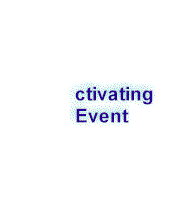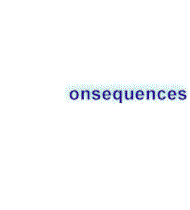Interpretations, Evaluations and Rules
There are countless ways of looking at life - how can you know which help and which hinder? Fortunately, there are some guidelines. It is probably most useful to start by learning how to recognise irrational thinking.
Why bother with problem thoughts? This is what distinguishes 'rational' from so-called 'positive' thinking: instead of rushing to tell yourself positive ideas, you first uncover and dispute the irrational ones. Otherwise, they remain untouched - and thus able to disturb you in the future.
What does irrational mean? To describe a belief as irrational is to say:
- It distorts reality (it is a misinterpretation of what is happening); or it involves some illogical ways of evaluating yourself, others and the world around you - awfulising, discomfort-intolerance, demanding, and people-rating.
- It blocks you from achieving your goals and purposes.
- It creates extreme emotions which persist, and which distress and immobilise.
- It leads to behaviours that harm yourself, others and your life in general.
The rules we live by
Dr Albert Ellis, a clinical psychologist who is the founder of Rational Emotive Behaviour Therapy, proposes that a small number of core beliefs underlie most unhelpful emotions and behaviours. Here are a few samples of common irrational beliefs or rules for living (click here to view the full list):
- I need love and approval from those significant to me, and I must avoid disapproval from any source.
- People should always do the right thing. When they behave obnoxiously, unfairly or selfishly, they must be blamed and punished.
- My unhappiness is caused by things which are outside my control, so there's little I can do to feel any better.
- I must worry about things that could be dangerous, unpleasant or frightening, otherwise they might happen.
- I can be happier by avoiding life's difficulties, unpleasantness and responsibilities.
- Events in my past are the cause of my problems, and they continue to influence my feelings and behaviours now.
Everyone has a set of general rules of this kind. Some are rational, others are similar to those above. Each person's set is different.
Mostly subconscious, the rules we hold determine how we react to life. When an event triggers a train of thought, what we consciously think depends on the general rules we subconsciously apply to the event. Say you hold the general rule, 'To be worthwhile, I must succeed at everything I do.' You happen to fail an examination - an event which, coupled with this rule, leads you to conclude, 'I'm not worthwhile.'
Again, suppose you believe, 'I can't stand discomfort and pain, so I must avoid them at all costs.' You lose a filling in a tooth, but know that going to the dentist would be painful; hence you conclude, 'I must avoid such unbearable pain, so I'll leave the dentist for now.'
Underlying rules are generalisations: one rule can apply to many situations. If you believe, for example, 'I can't stand discomfort and pain and must avoid them at all costs', you might apply this not just to the dentist, but also to work, relationships and life in general.
Why be concerned about your rules? While most will be valid and helpful, some will be irrational - and faulty rules will lead to faulty conclusions. Take the rule, 'If I am to feel OK about myself, others must like and approve of me.' Let us say that your boss tells you off. You may (rightly) think, 'He is angry with me' - but you may wrongly conclude, 'This proves I'm a failure.' Furthermore, changing the situation (for instance, getting your boss to like you) would still leave the underlying rule untouched. It would then be there to bother you whenever some future event triggered it off.
Interpretations and evaluations
How do we identify those underlying, general rules? It involves going beyond the surface interpretations we make to our evaluations or personal meanings.
In everyday life, events and circumstances trigger two levels of thinking: interpreting and evaluating. First, we attempt to interpret things in some way. That is, we make guesses or inferences about what is 'going on' - what we think has happened, is happening or will happen. Interpretations are statements of 'fact' (or at least what we think are the facts - they can be true or false).
For example, John's wife says she is feeling unhappy in herself and would like to go and stay with friends in Auckland for a few weeks to sort herself out. John then jumps to the conclusion that she wants to leave. This is his interpretation.
However, we still don't know what it means to John that his wife may be leaving. As well as interpreting things that happen, we also evaluate them in terms of what they mean to us. Evaluations go beyond 'facts': they are the meanings that we attach to what we interpret as the 'facts'.
What personal meaning does John attach to the prospect that his wife might leave? He could, for example, regard it as a good thing (if he wanted the marriage to end). But John evaluates it as a catastrophe that will lead to misery and prove he is a failure. He reacts accordingly, by feeling hopeless and putting himself down.
Note that John is not directly evaluating what has happened (his wife saying she is unhappy); rather, he is evaluating his interpretation of what has happened. Using the ABC model, we can summarise the chain of events as follows:
- John's wife says she is unhappy.
- John interprets what is going on: 'She's thinking of leaving.'
John evaluates his interpretation (decides what this means to him): 'This is a catastrophe'; 'I'll be miserable for the rest of my life'; 'I'm a failure.' - John feels hopelessness.
Note, too, that interpretations can be true or false, and evaluations can be rational or irrational. You can, of course, both interpret and evaluate something quite rationally. Unfortunately, you can also get things wrong twice over. Say, for instance, your boss wants to see you. You can start by misinterpreting this. You guess that he must be upset with you, when all he wants to do is offer you a raise. You can then go on to evaluate it irrationally ('It's awful', 'I can't stand it', 'I'm useless', 'He shouldn't treat me like this').
It is also possible to get one right but the other wrong, e.g. interpret something correctly (the boss is out to get you) but then evaluate it irrationally ('I can't stand it', etc.).
Here are some more examples to show the differences between events, interpretations and evaluations:
Event/Situation |
Interpretation |
Evaluation |
| Son won't do his homework. | He'll end up uneducated. | This would make me a failure as a parent. |
| Saw crash, one car had a young driver. | The young driver was at fault | These people shouldn't be allowed on the road. |
| Woke up feeling anxious. | There's too much pressure at work. | I can't stand it, so I'll have to take the day off. |
| Saw a cake. | That cake would be delicious. | I must have it. |
| He was really angry. | I caused it. | I'm a bitch. |
| Read that violent crime is on the increase. | New Zealand is going to the dogs. | The government should bring back the death penalty. |
What to look for
We are concerned mainly with the irrational beliefs, the ones that cause our problems. As we have seen, these are of three kinds - (1) interpretations, (2) evaluations and (3) general rules.
Interpretations
Irrational interpretations consist of distortions of reality: black-and-white thinking, filtering, overgeneralising, mind-reading, fortune-telling, emotional reasoning and personalising. Interpretations are usually conscious, though not always.
Evaluations
Irrational evaluations consist of :
-
awfulising: seeing something as awful, horrific, catastrophic or the like;
-
discomfort-intolerance: defining something as 'unbearable' or 'intolerable' (also known as 'discomfort-intolerance');
-
demanding: using 'shoulds' or 'musts'; and
-
people-rating: labelling or evaluating your total self (or someone else's).
These three are described in Chapters 5, 6 and 7 respectively.
Your evaluation of something may include both the circumstances and the people involved. In other words, you can awfulise about, see as unbearable, demand of or rate both situations ('I can't stand it', 'It should/must not happen', 'Things should be a certain way') and people ('It's awful that people are like this', 'I should have done better', 'People shouldn't behave like that', 'I'm a hopeless case', 'She's a bitch').
Evaluations/personal meanings are sometimes conscious but more often are beneath awareness. You uncover them by asking yourself, 'If my interpretation is true, how do I evaluate what is going on?' or, 'What does it mean to me?' Let us say, for example, your interpretation of news reports is that people are getting more violent. How do you evaluate this? What does it mean to you? You could evaluate it as 'terrible' (awfulising), 'intolerable' (can't-stand-it-itis), as meaning that the people concerned should be locked up (demanding), or as proving that they are 'animals' (people-rating).
Note that when you ask, 'How am I evaluating this' or, 'What does this mean to me?', you may at first come up with another interpretation, or sometimes a chain of them, like: 'Things are going to get worse'. . . 'Sooner or later someone is going to break into our home' . . . 'We'll be attacked' . . . 'We'll be killed'. Finally, you arrive at the evaluations: 'This would be awful. These people are animals. They should be locked up.'
How do you know when you have got to the irrational evaluation that is the real cause of your unwanted reaction? When you uncover awfulising, can't-stand-it-itis, demanding or people-rating.
Rules
Rules, as we saw earlier, are the underlying beliefs that guide how we react to life. What specific events mean to you (how you evaluate them) depends on the general rules you apply. The examples given earlier reflect general rules such as:
'If I fail at something important to me, this proves I'm a failure and therefore not worthwhile.'
'People should always behave correctly, and must be condemned and punished when they don't.'
'It's easier to avoid responsibilities than to face them.'
'I must have whatever I want and I can't stand the discomfort of being deprived.'
'I am responsible for other people's feelings, so I deserve to be condemned if I do anything that hurts or upsets them.'
'Violent people do not deserve to live.'
Note that an evaluation/personal meaning is a general rule applied to a specific situation. For example:
Interpretation: The young driver was at fault.
Evaluation: These kids should not be allowed on the road.
General rule: People should always behave correctly and must be punished when they don't.
Most irrational rules are a variation of one or other of the 12 irrational beliefs listed earlier. It would be worth your while to study this list carefully, even memorise it.
Putting it all together
In summary, people view themselves and the world around them on three levels:
-
interpretations,
-
evaluations/personal meanings,
-
underlying rules.
Your main aim is to get at the underlying, semi-permanent, general rules which are the continuing cause of your unwanted reactions. Here are some more examples (using the ABC model) to show how it all works (Click on "next" or "previous" to view the examples):
A |
B |
C |
 |
 |
 |
Rational thinking: in touch with the real world
Rational thinking presents a vivid contrast to its illogical opposite:
- It is based on reality. It emphasises seeing things as they really are, keeping them in perspective, preferring rather than demanding, and self-acceptance.
- It helps you achieve your goals and purposes.
- It creates emotions you can handle.
- It helps you behave in ways which promote your aims and survival.
We are not talking about so-called 'positive thinking'. Rational thinking is realistic thinking. It is concerned with facts - the real world - rather than subjective opinion or wishful thinking.
Realistic thinking leads to realistic emotions. Negative feelings aren't always bad for you, neither are all positive feelings beneficial. Feeling happy when someone you love has died, for example, may hinder you from grieving properly; or to be unconcerned in the face of real danger could put your survival at risk. Realistic thinking avoids exaggeration of both kinds, negative and positive.
This programme examines many new and more functional ways of viewing life. Other pages will help you understand distorting reality, awfulising, discomfort-intolerance, demanding and people-rating. Because these kinds of thinking underlie almost all emotional/behavioural problems, it is worth spending some time learning how to recognise and replace them.
Self-defeating beliefs and their rational alternatives
In the left-hand column are the sample beliefs presented earlier in this chapter. Beside each is a rational alternative.
Irrational beliefs |
Rational alternatives |
| I need love and approval from those significant to me, and I must avoid disapproval from any source. | Love, approval and respect from others are all good things - but they are not absolute necessities for my survival. And while I dislike disapproval, it is uncomfortable - not catastrophic; I can stand it - as I have many times before. Better that I learn to accept myself, independently of what others think of me. |
| People should always do the right thing. When they behave obnoxiously, unfairly or selfishly, they must be blamed and punished. | It's unfortunate that people sometimes do bad things. But humans aren't yet perfect, and upsetting myself won't change that reality. |
| My unhappiness is caused by things outside my control, so there's little I can do to feel any better. | Many external factors are outside my control. But it is my thoughts (not the externals) which cause my feelings - and I can learn to control my thoughts. |
| I must worry about things that could be dangerous, unpleasant or frightening, otherwise they might happen. | Worrying about things that might go wrong will not stop them happening. It will, though, ensure I get upset and disturbed right now! |
| I can be happier by avoiding life's difficulties, unpleasantnesses and responsibilities. | Avoiding problems is only easier in the short term - putting things off can make them worse later on. It also gives me more time to worry about them! |
| Events in my past are the cause of my problems, and they continue to influence my feelings and behaviours now. | The past can't influence me now. My current beliefs cause my reactions. I may have learned these beliefs in the past, but I can choose to analyse and change them in the present. |